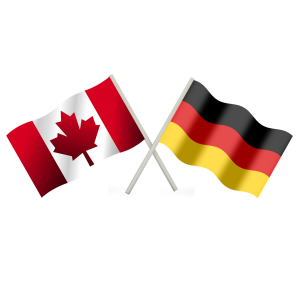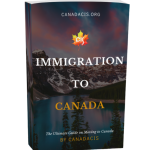Skilled Migration: How to Immigrate to Canada from Germany
Home » Blog » Immigration to Canada » Skilled Migration: How to Immigrate to Canada from Germany
And you can be one of them!
There are different ways of immigrating to Canada – more than 80 programs to choose from.
Most of our German clients choose Federal Skilled Worker Program (part of Express Entry), that’s why we want to tell you more about it.
With this program, you can work and live in Canada, with all benefits that come with it: excellent healthcare, quality education and so on.
Also, it’s a path towards your Canadian citizenship!
Sounds like a dream? Let us show you that it’s a real deal!
Table of Contents
want to find out if you're eligible for immigration to Canada?
👨🏭 What is the Federal Skilled Worker Program?
The Federal Skilled Worker Program (FSWP) is one of the economic immigration programs managed by Immigration, Refugees, and Citizenship Canada (IRCC) to select skilled foreign workers for permanent residency in Canada.
It is part of the Express Entry system, which is a points-based immigration system designed to evaluate and select candidates based on their age, education, work experience, language proficiency, and other factors.
If you have a profession and some years of work experience behind your back – chances are, this is a program for you!
✍️ How to apply for the Federal Skilled Worker Program?
Check your eligibility (hire an immigration consultant to do it for you – this way, you’ll be 100% sure your eligibility results are accurate).
Collect the necessary documents (ID, proof of work experience, education certificates, CV and so on).
Submit your application (You’ll get into a pool of candidates for Express Entry and be evaluated comparing to other applicants).
💼 What if my profession is not qualified for FSWP?
If your profession or occupation is not eligible for the Federal Skilled Worker Program (FSWP), there are several alternative pathways to immigrate to Canada, depending on your qualifications, skills, and circumstances. Chances are – you’ll find a place in Canada where your skills and experiences are very needed!
Here are some options to consider:
Many Canadian provinces and territories have their own immigration programs, known as Provincial Nominee Programs (PNPs). These programs target specific occupations and industries in demand within each province. If your occupation is in demand in a particular province or territory, you may be able to apply for nomination through a PNP stream.
Some provinces have PNP streams aligned with the federal Express Entry system. If you receive a provincial nomination through one of these streams, you will receive additional CRS points, significantly improving your chances of receiving an Invitation to Apply (ITA) for permanent residency.
If you have work experience in Canada, you may be eligible for the Canadian Experience Class (CEC) program. This program is designed for individuals who have worked in Canada and wish to transition to permanent residency.
If your occupation falls under the skilled trades category (Skill Level B of the National Occupational Classification), you may be eligible for the Federal Skilled Trades Program. This program is designed for individuals with experience in specific skilled trades occupations.
✈️ What about travelling? Do I need a visa to go to Canada?
As a German citizen, you do not need a visa to enter Canada for short visits (up to six months) for tourism, business meetings, family visits, or other similar purposes. However, you will need to obtain an Electronic Travel Authorization (eTA) before boarding your flight to Canada. The eTA is an entry requirement for visa-exempt foreign nationals traveling to Canada by air.
Here’s how the process works:
You can apply for an eTA online through the official website of the Government of Canada. The application process is straightforward and typically takes only a few minutes to complete.
When applying for an eTA, you will need to provide personal information, passport details, employment information, and contact information.
In most cases, eTA applications are approved within minutes. However, it’s advisable to apply well in advance of your planned travel date to ensure you have the necessary authorization.
An approved eTA is electronically linked to your passport and is valid for up to five years or until your passport expires, whichever comes first. You can use the same eTA for multiple trips to Canada during its validity period.
When traveling to Canada, make sure to bring the same passport that you used when applying for the eTA. The eTA will be verified electronically by airline staff before you board your flight.
If you are resident in Germany, but have a citizenship of another country, you should check whether your country is on the list of Visa-exempt countries.
It’s important to note that while an eTA allows you to visit Canada for tourism, business, or family visits, it does not grant you the right to work or study in Canada. If you plan to work, study, or stay in Canada for longer periods, you will need to apply for the appropriate visa or permit.
Before traveling, it’s a good practice to check the official website of the Government of Canada or consult the nearest Canadian embassy or consulate to ensure that you have the most up-to-date and accurate information regarding entry requirements and travel advisories.







